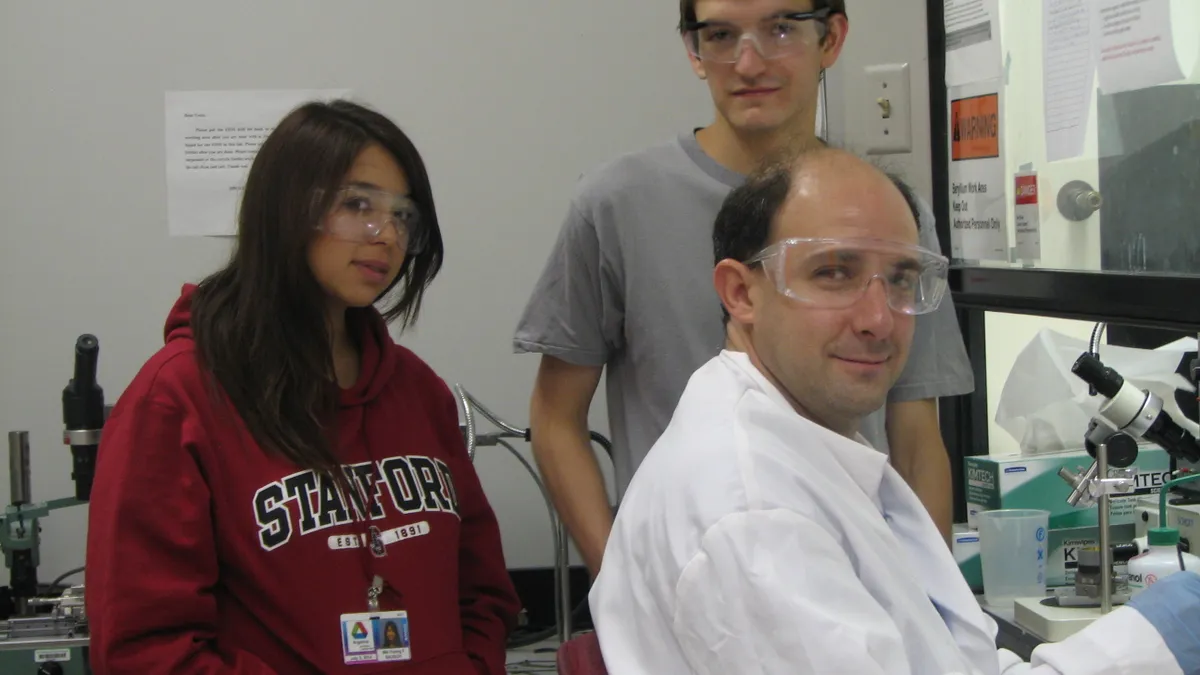Michael Pravica and Marshawn Lynch are at first glance (and second glance, third, fourth and fifth glances) an unlikely pair. But what the professor of physics at the University of Nevada, Las Vegas and the star running back of the NFL’s Oakland Raiders have in common — besides their joint appearances on the Bleacher Report’s new Facebook show, “No Script with Marshawn Lynch” — centers around explosions. For Lynch, it's his explosive runs on the field, and for Pravica, it is the study of “things that go boom.”
“The thing is, Marshawn is telling me, ‘man, you can blow s--- up,’ and I’m like, ‘yeah, Marshawn, actually, I do work with explosives, but I don’t get to blow them up,’ ” said Pravica, laughing during a recent phone interview with Education Dive. Actually, said Pravica, he prevents explosions so he can better study their causes.
Using a new form of science pioneered by his team of researchers at UNLV, which he calls useful x-ray induced chemistry, Pravica is harnessing x-ray technology to study explosions that could be experienced under a nuclear detonation, as well as what provokes the detonation of insensitive explosives used in bombs and other advanced weapons.
“One of the things that is sort of a Holy Grail of science is detonation. Nobody really understands how you go from mechanical energy into the … bond energy that makes it go," he said. “The problem is, to do experiments with things that go boom, it’s over in about 100 nanoseconds,” leaving little room for analysis.
With x-ray technology, however, researchers can create an environment that mimics the explosion, but in which “we don’t let them go boom, we don’t raise their temperature,” so the actual explosion never occurs. “X-rays are a much better way to control the chemical environment,” he said.
And this research has perhaps never been more timely.
“When you have this environment where this leader, Kim Jong Un is just a barbarian, and our current leader is saying ‘my button is bigger’ — none of us is going to win World War III,” he said. “We need to make sure our current stockpile is up to snuff,” and thorough research is how you get to that certainty, he said.
“If you’re going to say your button is bigger than someone else’s, you’d better be able to back it up with a good, solid arsenal. Don’t be bluffing, because people are going to catch the bluff.”
Pravica admits that though the Department of Energy, for example, is very interested in this particular application of the research, but he and his team are hoping to create new compounds for the electronics industry and non-linear optics, like lasers, and eventually launch a business to market the products created from these new compounds.
But it isn’t going to be easy. Just last month, Pravica was informed his center was losing its funding, thanks to 30% budget cuts at the Department of Energy arm that funds his work. And funding, not just for scientific research, but higher ed in general continues to decline.
Pravica continued, saying, “The thing is, our whole economy, our national welfare, as far as our health and our national security, are all based on science. America became a superpower because of the support in the 1940s of institutions like the National Science Foundation … that investment in scientific research paid extremely handsomely for the United States of America.”
However, part of the onus is on researchers to leave the ivory tower and make science more accessible to the general public by showing its real-life application.
From the ivory tower to the race track
“I would always encourage my fellow scientists that they need to get out and be more vocal," he said. "A lot of us, we like to stay in the ivory tower. ... But at the same time, I’m a professor. I should like to teach my students, the public. I bring them to my lab all the time.”
This is why joining Lynch in an episode of “No Script” was appealing, said Pravica. “I’m sorry to say I didn’t really know who Marshawn Lynch was” when Bleacher Report’s producers called, he said, laughing. But “I said sure, why not. It’s connecting teaching [with] some physics.”
Pravica joined Lynch to teach the science of drifting, and then was invited back to teach the physics of indoor skydiving — and later, to “blow some [stuff] up” on set.
Despite Lynch being such a combustible lab partner, Pravica said, “It went off perfectly.” He continued: “Marshawn is actually a nice guy if you get beyond the swearing, but I think that we had a really good interaction.
From my point of view, if I can get one or two of his fans to be interested in science, then I’ve done my job.”
Lynch, who attended the University of California, Berkeley before entering the NFL draft, called Pravica "cool" on one episode, and repeatedly said he should have been a scientist.
“I think Marshawn is actually a very intelligent guy, and I think he understands that he would like some of his fans to get interested in science,” said Pravica. “I think he was trying to make science cool.”
Investing in the pipeline
According to Pravica, affectionately dubbed “Scientist” by Lynch, many of the problems with both the weak pipelines for scientists and researchers in this country and the anti-intellectual climate that has arisen is the failure of scientists and others in academia to make the work relatable to people’s everyday lives.
“What I’m worried about is our society is getting a little too virtual, a little too disconnected from reality," he said. "Laboratory classes are a little more expensive, because you actually have to buy that equipment, but that is the most valuable because then they realize that yes, this actually connects to everything that I’m doing on a day to day basis,” he said.
“Science is not cheap," he add, "... but we’ve [lost] that preeminence [as a nation] because we’re not investing in science.”
Unfortunately, the scientist said, the current climate is one in which, increasingly, people want to see instant returns on money spent. But “you may take some decades before you see the return on the investment of science.”
This expense has trickled down from cuts to scientific research in higher ed to science education in K-12, which Pravica said is a grave threat to our national welfare and society.
“We’re going to need scientists and scientific research to improve and to figure out these impending crises, and so I’m very passionate about the need for our leaders to support science,” he said. “And yes, I am very worried about the current administration, and even past administrations, in terms of their levels of understanding of the criticality and how important science research is for driving our economy and our society and the welfare of our citizens.”
“We have so much potential in this country that exists in all classes, all races, all religions, all ethnic roots, and we need to tap into that potential, because that’s what makes us great," he said.

















